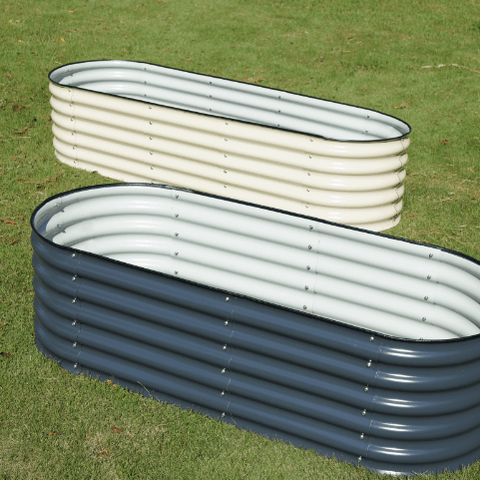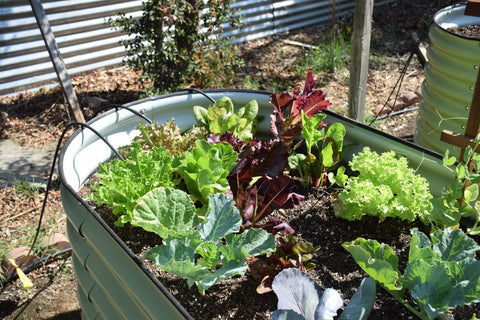Knowledge From Olle Garden Bed: Why Sprinkle Baking Soda In Compost
Sprinkling baking soda in compost can help create a more balanced and nutritious environment for your plants. Compost is commonly referred to as "black gold" due to its dark tone and nourishing properties, consisting of decomposed organic matter. Read here are some things that you should know when It comes to Olle Garden Beds!
The process of making compost is called composting. This is where various organic materials decompose with the help of beneficial bacteria, fungi, and other microorganisms. Although all of this has been said and done, composting is a complex process.
During the composting process, you may encounter common problems such as unpleasant odors, materials that refuse to decompose, or compost that is too wet or too dry. So what is the role of baking soda in fixed compost and how should you use it?
Using baking soda in composting
Sodium bicarbonate (baking soda) is a widely used household staple due to its wide availability, non-toxicity, and versatility. For gardening, baking soda is an excellent choice for making homemade fungicides, fighting powdery mildew, and has various benefits in composting. Discover the specific reason why you should use baking soda in compost!
1.Neutralize compost odor
Composting can produce unpleasant odors, especially if you add food residue. Conversely, unpleasant odors can attract unwanted pests and rodents. Baking soda has deodorizing properties that can help absorb and reduce these odors.
There is no standard quantity of baking soda that can be added to compost, as it may vary depending on factors such as the size of the compost pile and the acidity of the compost material. However, the general rule is to use baking soda with caution, as excessive use can disrupt the natural balance of baking soda and harm beneficial microorganisms, including earthworms.
If your compost smells bad, please take some time to understand the spread of the odor and possible reasons. If the odor smells more vinegar and rotten eggs, the compost pile is likely to be submerged in water and lack oxygen. When your compost contains more substances rich in green nitrogen, such as kitchen waste, fresh fallen leaves, and grass shavings, it will produce an odor similar to ammonia. Baking soda neutralizes strong acids (such as vinegar) and strong bases (such as ammonia) by deactivating its molecules. By understanding why your compost smells bad, you can change its composition in the future.
Professional tip: A safer alternative to baking soda is to add materials rich in brown carbon, such as dried leaves, hay, and crushed newspapers as absorbers. Then, rotate the pile to promote the air circulation required for aerobic decomposition, which will neutralize the unpleasant odor.
2.Combat mosquitoes and gnats
Fungal black flies mainly gather in damp and decaying environments. Although they do not pose a threat to humans, they can cause harm to plants and can be troublesome when flying in groups. If you find small insects like fruit flies circling around your pile, sprinkle a little baking soda and mix it to prevent mosquitoes and gnats.
Technically speaking, baking soda does not kill mosquitoes and gnats, but it helps reduce the odor of the pile and keep them away. Mosquitoes and gnats are attracted to compost boxes because of their attraction to water and fungi. The reason behind this is that the humid and fungal environment emits a scent that attracts mosquitoes and gnats, causing them to gather in large numbers. When you sprinkle baking soda, you mask the scent that attracts them, thereby preventing them from disappearing from your pile.
In addition to baking soda, you can also increase the temperature of the stack by adding more green and brown substances and rotating them to promote air circulation. Doing so will increase the temperature to above 120 degrees and solve the error problem (by reducing odor).
3.Neutralizing acidic compost
In the initial stage of composting, organic acids make the compost acidic, which helps with the decomposition process. As compost matures (i.e. Undergoes four stages of composting), it becomes neutral with a ph value between 6 and 8. Hot compost undergoes four different stages before it matures and is ready for use:
Environment (room temperature)
Thermophilic (50 to 100 degrees Fahrenheit)
Thermophilic (104 to 150 degrees Fahrenheit)
Thermophilic (50 to 100 degrees Fahrenheit)
Environment (room temperature) - ready to use.
However, sometimes composting can be too acidic, especially if you add high acidic components such as fallen oak leaves, pine needles, and beech leaves to the pile. Low (acidic) ph values slow down decomposition by hindering the transition from the thermophilic phase to the thermophilic phase in compost. When hemorrhoids transition from thermophilic to thermophilic, the ph value becomes more alkaline.
If the transition does not occur and your compost is acidic in the final stage, you can increase its ph by sprinkling a thin layer of baking soda on its surface. Then mix them with a shovel. Sodium bicarbonate serves as a ph balancer and can help neutralize acidity in compost. However, before using compost soaked in baking soda for your plants, it is necessary to test the ph value to ensure that it meets the ph requirements of the plant you want to plant.
Reminder: It is best to start with a small amount of baking soda and observe the effect before adding more.
Testing the ph value of compost
You can use baking soda to test the ph value of compost.
Put 4 tablespoons of compost into a disposable cup,
Add 2 tablespoons of distilled water to the sample and mix
Add 1/2 cup of baking soda to the slurry and evaluate the reaction:
If it bubbles or hiss when in contact, then your compost is acidic,
Assuming there is no reaction, then your compost is alkaline.
If you want to purchase baking soda online, please check out Miliad baking soda on Amazon. Milliard is a multifunctional brand that offers a range of products, including baking soda, and they are recognized for this. Their baking soda is widely praised for its ph buffering and sterilization properties, and does not contain additives or preservatives. In addition, the bag is resealable, which means a longer shelf life.
Don't be salty!
Baking soda is a versatile solution used to prevent mosquitoes and gnats, test compost ph, and neutralize odors. However, excessive use of baking soda in composting can disrupt the natural balance of the pile and harm beneficial microorganisms, including earthworms. If you are unsure how much baking soda to use, start with a small amount and observe the effect before adding more.
So, what is your opinion on baking soda?


